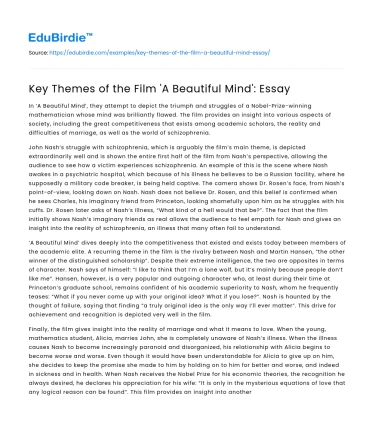In ‘A Beautiful Mind’, they attempt to depict the triumph and struggles of a Nobel-Prize-winning mathematician whose mind was brilliantly flawed. The film provides an insight into various aspects of society, including the great competitiveness that exists among academic scholars, the reality and difficulties of marriage, as well as the world of schizophrenia.
John Nash’s struggle with schizophrenia, which is arguably the film’s main theme, is depicted extraordinarily well and is shown the entire first half of the film from Nash’s perspective, allowing the audience to see how a victim experiences schizophrenia. An example of this is the scene where Nash awakes in a psychiatric hospital, which because of his illness he believes to be a Russian facility, where he supposedly a military code breaker, is being held captive. The camera shows Dr. Rosen’s face, from Nash’s point-of-view, looking down on Nash. Nash does not believe Dr. Rosen, and this belief is confirmed when he sees Charles, his imaginary friend from Princeton, looking shamefully upon him as he struggles with his cuffs. Dr. Rosen later asks of Nash’s illness, “What kind of a hell would that be?”. The fact that the film initially shows Nash’s imaginary friends as real allows the audience to feel empath for Nash and gives an insight into the reality of schizophrenia, an illness that many often fail to understand.
Save your time!
We can take care of your essay
- Proper editing and formatting
- Free revision, title page, and bibliography
- Flexible prices and money-back guarantee
‘A Beautiful Mind’ dives deeply into the competitiveness that existed and exists today between members of the academic elite. A recurring theme in the film is the rivalry between Nash and Martin Hansen, “the other winner of the distinguished scholarship”. Despite their extreme intelligence, the two are opposites in terms of character. Nash says of himself: “I like to think that I’m a lone wolf, but it’s mainly because people don’t like me”. Hansen, however, is a very popular and outgoing character who, at least during their time at Princeton’s graduate school, remains confident of his academic superiority to Nash, whom he frequently teases: “What if you never come up with your original idea? What if you lose?”. Nash is haunted by the thought of failure, saying that finding “a truly original idea is the only way I’ll ever matter”. This drive for achievement and recognition is depicted very well in the film.
Finally, the film gives insight into the reality of marriage and what it means to love. When the young, mathematics student, Alicia, marries John, she is completely unaware of Nash’s illness. When the illness causes Nash to become increasingly paranoid and disorganized, his relationship with Alicia begins to become worse and worse. Even though it would have been understandable for Alicia to give up on him, she decides to keep the promise she made to him by holding on to him for better and worse, and indeed in sickness and in health. When Nash receives the Nobel Prize for his economic theories, the recognition he always desired, he declares his appreciation for his wife: “It is only in the mysterious equations of love that any logical reason can be found”. This film provides an insight into another aspect of society that is often considered obsolete, the reality of marriage and the reality of love.






 Stuck on your essay?
Stuck on your essay?

